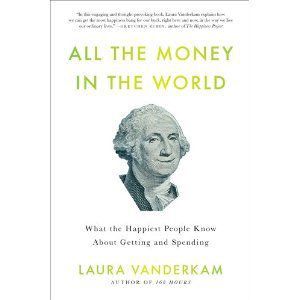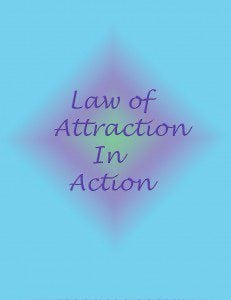 I write a lot about how money can’t buy happiness. Having it won’t substitute for unhappiness inside you. But Laura Vanderkam, my guest today, has an interesting take on it. She’s the author of several books, including her new one, All The Money In The World: What Happiest People Know About Getting and Spending and 168 Hours: You have more Time Than You Think.
I write a lot about how money can’t buy happiness. Having it won’t substitute for unhappiness inside you. But Laura Vanderkam, my guest today, has an interesting take on it. She’s the author of several books, including her new one, All The Money In The World: What Happiest People Know About Getting and Spending and 168 Hours: You have more Time Than You Think.
How Money Can Buy Happiness?
by Laura Vanderkam
When it comes to money, we tend to think a lot about context. Consider this: you see a sign advertising that some neighbor kids a few blocks away are selling lemonade. You decide to walk over, figuring it will cost 50 cents for a cup. When you get to the booth, though, you see they’re charging $25.50. Outraged, you walk home.
But let’s say you are going to a nearby mall to buy a $500 chair. You have a $25-off coupon for the store, but once you get there, the clerk points out that it expired. Would you refuse to buy the furniture?
For many of us, the answer to the second question is no. We’d still shell out the extra cash, because in the context of a $500 chair, $25 seems like a small amount. In the context of a glass of lemonade, it seems ridiculous. But in both cases, you’re out $25 more than you intended to spend. Money is money. It is completely fungible. A dollar spent on one thing can always be spent on something else, and the $25 you deem a rounding error on the chair can buy the exact same amount as the $25 you view as price gouging on the lemonade. Now, to be sure, there may be psychological justifications you go through (the $25 loss on the chair will be amortized over multiple uses, whereas you’re just drinking the lemonade once). Still, the point is, you’re a lot more unhappy about the lemonade than the chair.
That’s just the way our brains work. As I’ve been thinking about how we earn and spend our money, though, I’ve realized that there are some big upsides to learning to think differently about money and context. Here’s another insight into how our brains work: it’s really fun to splurge. But what is a splurge? In the context of a mortgage payment, an extra $50 doesn’t seem huge. Spread out over a 30-year mortgage, it is the difference between a $300,000 home and a $310,000 home at 5% interest rates. In the context of such a purchase, particularly in this market where the house was likely listed for $350,000, this difference doesn’t seem big — possibly to the point where you and your real estate agent aren’t negotiating that hard.
But in other contexts, $50/month can buy a lot. That’s $600 a year, which could buy you family memberships at four area attractions: a zoo, an aquarium, a children’s museum and an art museum. That could keep your family entertained for a long, long time. And even if it’s not a trade-off for you — you’d do the memberships and the $50 extra on the mortgage — that $600 could let you buy memberships for another young family that you know is struggling. How fun would that be? Or let’s say you’re home with little kids, and you love movies. An extra $50/month could buy you a babysitter and a blissful solo matinee (with popcorn!) An extra $50/month at the grocery store can buy you a once-a-week culinary adventure: king crab legs one week, filet mignon instead of cheaper cuts another, some sort of fancy cheese plate the third, and so forth.
And did I mention that you’d get to continue that weekly culinary adventure for 30 years? That’s the opportunity cost of not negotiating hard on that last bit of your mortgage. Oh, sure, the house may appreciate. But it might not, too (and, of course, more appreciation is possible on a lower base). If it doesn’t, at least you got a lot of joy out of splurging on your cheese plates.
When it comes to buying happiness, here’s a way to use context to our advantage: fight hard on the big stuff. Try to keep recurring monthly payments low. And then splurge on the varying pleasures of everyday life. Maybe not $25.50 lemonade. But a big bouquet of supermarket flowers every week for a loved one, and not just on Valentine’s Day? That sounds smart.
***************
Check out Laura Vanderkam‘s new book, All The Money In The World: What Happiest People Know About Getting and Spending
***************
Take the 31 Days of Self-Love Challenge and get my book, How Do I Love Me? Let Me Count the Ways for free at http://howdoiloveme.com. And you can post your loving acts HERE to reinforce your intention to love yourself. Read my 31 Days of Self-Love Posts HERE.
Please leave comments under my posts so we can stay connected.

